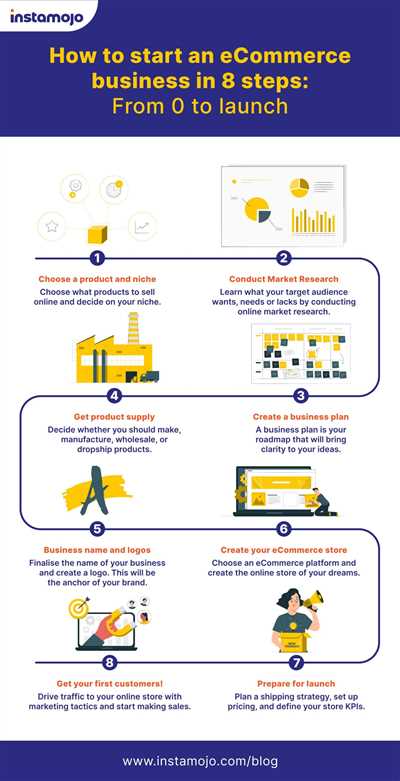
Are you thinking about starting your own online business? If so, you’re not alone. Ecommerce has become an incredibly popular way to sell products and services, and it’s only continuing to grow. But where do you begin? In this article, we’ll outline the basic steps you need to take to establish your own ecommerce business, from choosing the right niche to creating a strong brand.
One of the first things you’ll need to do is choose a niche. This is a specific market or industry that you want to target with your online store. It’s important to choose a niche that you’re passionate about and have knowledge in, as this will make it easier for you to differentiate yourself from your competitors and establish your authority in the market.
Once you’ve chosen your niche, you’ll need to come up with a unique name for your online store. This name should be memorable and reflective of your brand. It’s also important to make sure that the name you choose is legally available and not already being used by another business. You can check for the availability of domain names through various online platforms.
After you’ve established your niche and chosen a name, you’ll need to outline the details of your business, including how you plan to fund it and what your future goals are. This will help you stay focused and ensure that you’re taking the necessary steps to achieve your objectives. It’s also helpful to create a business plan, as this will serve as a roadmap for your ecommerce journey.
Next, you’ll need to set up your online store. There are many different ecommerce platforms that you can choose from, including free options like WooCommerce and paid options like Shopify. Take the time to research these platforms and choose the one that best meets your needs. Remember to also consider factors like ease of use, payment options, and the ability to integrate with other tools and platforms.
Once your store is set up, it’s time to start listing your products. This is where you’ll want to put your best foot forward and make sure that your product descriptions are informative and appealing to potential customers. Use high-quality images and provide all of the necessary details about each product. This will help to build trust with your customers and increase the likelihood of making a sale.
Now that your store is open and your products are listed, you’ll need to make sure that you’re legally compliant. This includes understanding your tax obligations and ensuring that you’re collecting the necessary sales tax from customers. It’s helpful to consult with an accountant or tax professional to make sure that you’re following the correct procedures.
Finally, don’t forget about marketing and promoting your ecommerce business. There are many different channels you can use to reach your target audience, including social media, email marketing, and search engine optimization. Take the time to understand the different marketing strategies and find the ones that work best for your business.
Starting an ecommerce business can be a challenging and rewarding process. By following these steps and staying focused on your goals, you’ll be well on your way to creating a successful online store. Remember to stay unique, understand your customers’ needs, and differentiate yourself from your competitors. With the right approach and a strong brand, you can turn your ecommerce dreams into a thriving reality. Good luck!
- 9 Key Steps to Start a Successful Ecommerce Business From Home
- Starting with the Basics
- Choose Your Product Niche
- Differentiate Your Business
- Brand Your Business
- Legally Establish Your Business
- How to Start an eCommerce Business
- How to Fund Your E-commerce Business
- Video:
- HOW TO START AN E-COMMERCE BUSINESS IN 2023 | Beginners Guide
9 Key Steps to Start a Successful Ecommerce Business From Home
Starting an ecommerce business from home can be an exciting and rewarding venture. However, it requires careful planning and execution to ensure its success. Here are 9 key steps to help you get started:
- Understand the Ecommerce Basics: Familiarize yourself with the basic concepts and principles of ecommerce, including online platforms, shipping processes, and customer needs.
- Choose a Niche: Determine what specific product or service you want to sell. Focus on a niche market to differentiate yourself from competitors.
- Research Your Competitors: Analyze what your competitors are doing and understand their approach, branding, and customer base. This will help you identify what’s working and what’s not.
- Create a Unique Brand: Develop a strong and unique brand identity that appeals to your target audience. This includes choosing a catchy business name, establishing a professional website, and using social media platforms for marketing.
- Outline Your Business Plans: Create a comprehensive business plan that outlines your goals, marketing strategies, and financial projections. This will help you stay organized and focused throughout the process.
- Secure Funding: Determine if you need funding to start your ecommerce business and explore different funding options available, such as loans or investors.
- Ensure Legal Compliance: Understand the legal requirements for starting an ecommerce business, including taxes, licenses, and regulations. Ensure that your business is legally compliant to avoid any complications in the future.
- Establish a Strong Online Presence: Utilize various online marketing techniques to promote your ecommerce store and attract customers. This includes search engine optimization (SEO), social media marketing, and email campaigns.
- Focus on Customer Satisfaction: Make sure to prioritize customer satisfaction by offering excellent customer service, providing easy navigation on your website, and offering competitive prices. Happy customers are more likely to recommend your business and make repeat purchases.
By following these 9 key steps, you can lay a strong foundation for your home-based ecommerce business and increase the chances of its success. Remember to continuously adapt and refine your strategies depending on the changing market trends and customer preferences.
Starting with the Basics
When it comes to starting an ecommerce business, it’s important to understand the basic processes involved. This includes choosing a unique brand name and niche for your online store, as well as outlining the specific products you want to sell.
To ensure you’re starting off on the right foot, it’s also important to make sure you have a strong understanding of the legal and tax requirements for ecommerce businesses. This will help you stay compliant and avoid any issues down the road.
Once you have the basics in place, you’ll need to create an online store. There are many different platforms to choose from, ranging from free options to more advanced paid solutions. Take the time to research and choose the platform that best fits your needs and budget.
While setting up your online store, don’t forget about the importance of branding and establishing yourself as an authority in your niche. This can help attract customers and build trust. It’s also important to have a strong marketing plan in place, including strategies for social media and other marketing channels.
When it comes to choosing products to sell, it’s important to take a strategic approach. Research your competitors and what’s already available in the market, and then find a unique selling point that sets your products apart.
Now that your store is open, it’s important to have processes in place to ensure smooth operations. This includes details like shipping and handling, customer service, and order fulfillment.
Throughout the process of starting and running your ecommerce business, it’s important to stay focused on the long-term. While it’s important to be flexible and willing to adapt, having a clear vision and goals will help you make decisions that align with your overall strategy.
Remember, starting an ecommerce business is a journey. It may take time and effort to establish a successful online brand, but with the right approach, funding, and marketing strategies, you can make your dreams a reality. Good luck!
Choose Your Product Niche
When it comes to starting an ecommerce business, one of the first steps is to choose your product niche. This is the fundamental decision that will lay the foundation for your entire business.
Before diving into the specifics, it’s important to understand the basics. A product niche refers to a specific category or market segment within a larger industry. It’s the area in which your business will focus its efforts.
Choosing the right product niche is key to your success. You want to find a niche that not only aligns with your interests and passion, but also has a demand in the market. It’s important to do thorough research to understand what products are currently selling well and what the competition looks like.
There are several factors to consider when choosing your product niche. First, you need to assess your own skills, interests, and experience. What are you knowledgeable about? What are you passionate about? This will help you stay motivated and will make the business journey more enjoyable.
Next, you need to consider the market demand. Is there a demand for the products you plan to sell? Are there already existing businesses selling similar products? If there is competition, what can you do to differentiate yourself and stand out?
Researching your competitors is a helpful step in the process. Take a look at what they’re doing right, and what they’re doing wrong. This will give you insights into what you can do differently with your own business.
Once you have a clear understanding of your own skills and the market demand, it’s time to brainstorm product ideas. Make a list of potential products that fit within your chosen niche. Consider both the basic products as well as any unique or specialized items that you could offer.
Next, you’ll want to think about the logistics of selling your products online. What platforms or ecommerce platforms do you plan to use? Do they have the features and functionality you require? Consider things like payment processing, inventory management, and shipping requirements.
It’s also important to consider the legal and financial aspects of running an ecommerce business. This includes things like registering your business, obtaining the required permits and licenses, and understanding the tax requirements in your country or state.
Once you have a clear idea of the product niche you want to focus on, it’s time to start creating your online store. This involves choosing a domain name, creating a website, and outlining a marketing plan.
Choosing a domain name is important as it will serve as your online brand. Make sure it is strong, memorable, and relevant to your niche. You want it to reflect your brand identity and make a lasting impression on your customers.
Creating a website involves the technical processes of setting up your online store and listing your products. Most ecommerce platforms have user-friendly interfaces that make this process relatively easy, even for those who don’t have a technical background.
Finally, you’ll need to outline a marketing plan to promote your store and drive traffic. This can include strategies such as search engine optimization (SEO), social media marketing, and paid advertising.
Remember, while the process of starting an ecommerce business may seem daunting at first, there are plenty of resources and platforms available to help you along the way. Take advantage of free online courses, e-books, and forums to gain a deeper understanding of the ecommerce landscape.
In conclusion, choosing your product niche is a crucial step in starting your ecommerce business. Take the time to research and understand the market demand, differentiate yourself from your competitors, and outline a strong marketing plan. With the right product niche and a solid business plan in place, you can make your dream of selling products online a reality.
Differentiate Your Business
When it comes to ecommerce, differentiation is the key to success. With so many online stores out there, it’s important to stand out from the crowd and offer something unique to your customers. Here are 9 steps to help you differentiate your business and create a strong and successful online presence.
- Understand Your Niche: Before you start selling online, take the time to understand your target market and identify a specific niche or audience that you want to serve. This will help you tailor your products and marketing approach to meet their needs and wants.
- Create a Unique Brand: A strong brand not only helps you differentiate your business, but it also builds trust and loyalty with your customers. Choose a name and logo that are memorable and reflective of your brand values.
- Choose the Right Platform: There are many ecommerce platforms available, each with its own set of features and benefits. Do your research and choose a platform that aligns with your business needs and goals.
- Have a User-Friendly Website: Your website is your online storefront, so make sure it’s easy to navigate and visually appealing. Provide detailed product descriptions and high-quality images to help customers make an informed purchasing decision.
- Offer Unique Products: Stand out from your competitors by offering unique or hard-to-find products. This will attract customers who are looking for something different and increase your chances of making sales.
- Stay Active on Social Media: Social media marketing is a powerful tool for ecommerce businesses. Engage with your customers, share helpful content, and promote your products to build a strong online presence.
- Ensure Legal Compliance: Make sure you understand the legal requirements for selling online, including taxes, licenses, and permits. Stay on top of any changes or updates to ensure you’re operating legally.
- Offer Excellent Customer Service: Treat your customers like gold and provide exceptional customer service. Respond to inquiries promptly, resolve issues effectively, and always strive to exceed customer expectations.
- Continuously Innovate: The ecommerce landscape is constantly evolving, so it’s important to stay ahead of the curve. Continuously monitor industry trends, explore new marketing strategies, and adapt your business processes to stay competitive.
By following these steps, you can differentiate your business from the competition and create a successful ecommerce venture. Remember, success in ecommerce takes time and effort, so stay focused, stay motivated, and never stop learning and improving.
Brand Your Business
When starting an e-commerce business, one of the most important steps is to establish a strong brand identity. Your brand is what sets you apart from your competition and helps your customers recognize and remember you. Here are some key steps to take to ensure your brand is unique and memorable:
- Choose a unique business name: Your business name should reflect your niche and be catchy and memorable. Take the time to research if the name is already taken or trademarked, and ensure it is legally available for use.
- Create a unique logo: A visually appealing and professional logo can help differentiate your brand and make it stand out. There are free online logo makers available that can help you create a basic logo.
- Establish your brand’s voice: Decide on the tone and style of communication you want to use with your customers. This will help your brand stay consistent across different platforms, including social media and marketing campaigns.
- Outline your brand’s values: Clearly define what your brand stands for and what sets it apart from other businesses. This will be helpful when developing your marketing strategies and connecting with your target audience.
- Stay consistent: Consistency is key to building a strong brand. Make sure your brand elements, such as colors, fonts, and messaging, are consistent across all your online stores and marketing materials.
- Choose the right e-commerce platform: Depending on your specific needs and goals, choose the e-commerce platform that best suits your business. There are many options available, including Shopify, WooCommerce, and Magento, among others.
- Understand the legal requirements: Make sure you understand the legal processes and requirements for starting an e-commerce business, including taxes, shipping, and any necessary permits or licenses.
- Fund your business: Depending on your plans and goals, you may need funding to start your e-commerce business. Explore different funding options, such as loans or crowdfunding, to ensure you have the necessary resources.
- Differentiate yourself: Research your competition and identify what makes your business unique. Highlight these qualities in your branding to help set yourself apart from others.
By following these steps, you can create a strong and successful e-commerce business that stands out from the rest. Remember, the key is to stay consistent, understand your target audience, and deliver value through your products and services.
Legally Establish Your Business
When starting an e-commerce business, it’s important to ensure that you are legally established. This includes choosing the right business structure, obtaining the required licenses and permits, and understanding the tax obligations.
Here are some steps to help you legally establish your e-commerce business:
- Choose a Business Structure: Decide on the legal entity for your business, whether it’s a sole proprietorship, partnership, LLC, or corporation. Each structure has its advantages and disadvantages, so consider consulting an authority on the matter to make the best choice for your specific needs.
- Register Your Business Name: Choose a unique name for your e-commerce business and make sure it’s not already taken. You may need to register the name with the appropriate authority in your jurisdiction.
- Create a Business Plan: Outline your goals, target market, competition, and marketing strategies in a written business plan. This will not only guide your future actions but also help you secure funding if required.
- Obtain Licenses and Permits: Find out what licenses and permits are required to operate an e-commerce business in your area. This may include a general business license, sales tax permit, and any industry-specific permits.
- Understand Tax Obligations: Familiarize yourself with the tax regulations for e-commerce businesses, including sales tax and income tax requirements. Consult with an accountant or tax advisor to ensure you’re complying with the law.
- Set Up Your Website: Create an online store or website to sell your products. Consider using e-commerce platforms that provide the necessary tools and processes for setting up and managing an online store.
- Secure Your Intellectual Property: Protect your intellectual property, including trademarks, copyrights, and patents. This will help prevent others from using your unique ideas or brand identity.
- Establish Strong Customer Policies: Clearly outline your terms of service, refund policy, shipping and delivery process, and customer support policies. This will help ensure a positive customer experience and protect both your business and your customers.
- Market Your Business: Develop a marketing strategy to promote your e-commerce business. Utilize social media, search engine optimization, email marketing, and other digital marketing channels to reach your target audience.
By following these steps and ensuring that your e-commerce business is legally established, you’ll be setting yourself up for a successful and legally compliant venture.
How to Start an eCommerce Business
Starting an eCommerce business can be an exciting and rewarding venture. However, it requires careful planning and understanding of the key steps involved. Here, we outline the basics to help you get started on creating your own successful online store.
1. Choose a unique name for your business: Coming up with a catchy and memorable name is essential in establishing a strong brand presence. Make sure the name you choose is not already taken and that it accurately represents your products or services.
2. Understand your target audience: Before diving into the world of eCommerce, it’s important to understand who your target customers are. Conduct market research to gather insights about their needs, preferences, and behavior.
3. Create a business plan: A well-thought-out business plan will guide you through the process of starting and running your eCommerce business. This plan should outline your goals, target market, marketing strategies, and financial projections.
4. Choose an eCommerce platform: There are various eCommerce platforms available that offer different features and pricing plans. Depending on your business needs, choose a platform that best suits you. Some popular options include Shopify, WooCommerce, and Magento.
5. Set up your online store: Once you’ve chosen a platform, it’s time to set up your online store. This involves choosing a design theme, adding product details, setting up payment and shipping options, and configuring any additional plugins or extensions.
6. Differentiate yourself from competitors: With so many online stores out there, it’s important to find ways to stand out from your competitors. Offer unique products, exceptional customer service, and effective marketing strategies to attract and retain customers.
7. Ensure legal compliance: Before selling anything online, ensure that you comply with all relevant laws and regulations. This includes registering your business, obtaining any necessary licenses, and understanding your tax obligations.
8. Market your online store: Creating a website is just the first step; you also need to drive traffic to your online store. Utilize various marketing strategies such as social media marketing, search engine optimization (SEO), and email marketing to reach your target audience.
9. Stay updated and adapt: The world of eCommerce is constantly evolving, so it’s important to stay updated with the latest trends and technologies. Keep learning and adapting your business processes to stay ahead of the competition.
By following these steps and continuously adapting, you can successfully start an eCommerce business and make it thrive in the online marketplace.
How to Fund Your E-commerce Business

Starting an e-commerce business requires funding to cover various expenses, including website development, product sourcing, marketing, and shipping. Understanding different funding options is crucial for ensuring the success of your business. Here are nine key steps to help fund your e-commerce business:
1. Understand Your Business Needs: Before you start seeking funding, determine how much capital your e-commerce business requires to get off the ground. This will help you identify the most suitable funding options for your specific needs.
2. Create a Business Outline: Develop a basic outline of your e-commerce business, including the products you plan to sell, your target market, and your unique selling proposition. This will help you stay organized and differentiate yourself from competitors.
3. Choose a Strong Brand Name: Selecting a memorable and relevant brand name is important for the success of your online store. Be sure to choose a name that is legally available and aligns with your niche and target customers.
4. Establish a Website: Set up a user-friendly and visually appealing e-commerce website. There are various platforms you can use to create your online store, including free options like WordPress and Shopify.
5. Know Your Niche: Identify a specific niche within the e-commerce market for your business. Focusing on a niche allows you to target a specific audience and become an authority in that area.
6. Choose Your Products: Determine which products you want to sell. Conduct market research and analyze customer demand to ensure your chosen products will be profitable.
7. Take Care of Legal and Tax Processes: Ensure that you comply with legal requirements and tax obligations related to your e-commerce business. Register your business, obtain necessary permits, and familiarize yourself with the applicable tax regulations.
8. Develop a Marketing Strategy: Create a comprehensive marketing plan to promote your e-commerce business and attract customers. Utilize various online marketing channels, such as social media, SEO, and paid advertising, to reach your target audience.
9. Fund Your Business: Explore funding options to cover the expenses of starting and growing your e-commerce business. Some common funding sources include personal savings, loans, investors, crowdfunding, and grants. Choose the funding option that aligns best with your business goals and financial situation.
By following these key steps, you can turn your e-commerce business ideas into a reality and ensure you have the necessary funding to get started and thrive in the online marketplace.









